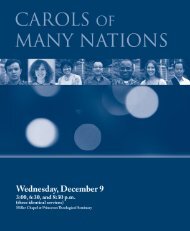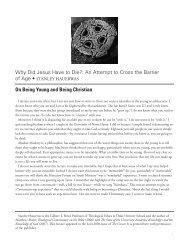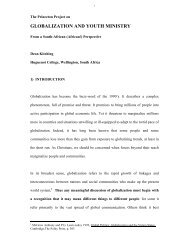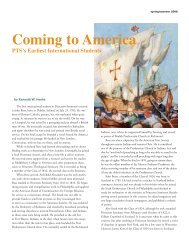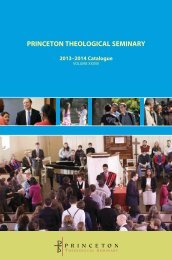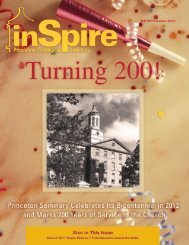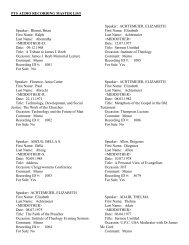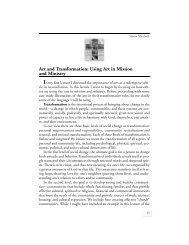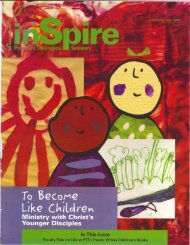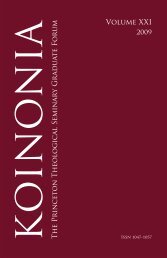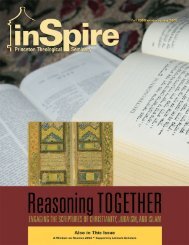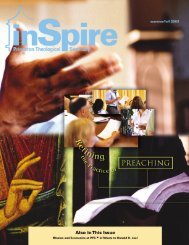Perspectivas/Occasional Papers • Fall 2006Perspectivas/Occasional Papers • Fall 200615 Mary L. Gautier, Ph.D., “Catholic Ministry Formation Enrollments: StatisticalOverview for 2005–2006,” Center for Applied Research in the Apostolate,Georgetown University, Washington, DC (April 2006), 11.http://cara.georgetown.edu/Overview0506.pdf16 Mary L. Gautier, Ph.D., “Catholic Ministry Formation Enrollments: StatisticalOverview for 2005–2006,” Center for Applied Research in the Apostolate, 30.17 Mark M. Gray and Mary L. Gautier, “Summary of ‘Latino/A Catholic Leaders InThe United States,’” in Strengthening Hispanic Ministry Across Denominations: A CallTo Action, Edwin I. Hernández, Milagros Peña, Rev. Kenneth Davis, CSC, andElizabeth Station, eds., Pulpit and Pew Research Reports (Durham, N.C.: DukeDivinity School, 2005), 19. http://www.pulpitandpew.duke.edu/latinoministry.html18 United States Conference of Catholic Bishops, “Encuentro and Mission: A RenewedPastoral Framework for Hispanic Ministry,” Appendix, #75. http://www.usccb.org/hispanicaffairs/encuentromission.shtml19 Association of <strong>Theological</strong> Schools, “Diversity in <strong>Theological</strong> Education,” Folio, seeRacial/Ethnic Enrollment by Decade, 1969 – 1999,” and “Full-Time Racial/EthnicFaculty in ATS Member Schools 1980, 1991, 2001.”http://www.ats.edu/resources/foliocol.pdf20 Association of <strong>Theological</strong> Schools, 2005-2006 Annual Data Tables, see “Table 2.18Head Count Completions Degree Program, Race or Ethnic Group, and Gender AllMember Schools.” http://www.ats.edu/resources/FactBook/2006/2005-06%20Annual%20Data%20Tables.pdf21 Caroline Sotello Viernes Turner, Edwin Hernández, Milagros Peña, Juan CarlosGonzález, Kate Dillon Hogan, Elizabeth Station, “An Evaluation: Perspectives on theHispanic <strong>Theological</strong> Initiative,” Perspectivas/Occasional Papers (Fall 2005), 65.22 Manya A. Brachear and Margaret Ramírez, “Catholic School Closings: Latino, BlackParishes Hit Hardest by Decision,” Chicago Tribune (February 25, 2005).http://www.chicagotribune.com/news/local/chi0502250210feb25,1,3629470.story?coll=chi-news-hed&ctrack=1&cset=true (originally). Now available onhttps://mail.prairienet.org/pipermail/lpcc-listserv/2005-September/000335.html23 Richard Szczepanowski, “Archdiocese Issues Hispanic Pastoral Plan, ‘Diverse inCulture, United in Faith,’” Catholic Standard (June 8, 2006).http://cathstan.org/news/06-08-06/3.shtml24 Rev. Dr. Raúl Gómez and Dr. Manuel Vásquez, Hispanic Ministry Study.http://www.usccb.org/hispanicaffairs/studygomez.shtml25 Hispanic Affairs Committee, United States Conference of Catholic Bishops,“Encuentro 2000.” http://www.usccb.org/hispanicaffairs/encuentro.shtml26 “Encuentro 2000.” http://www.usccb.org/hispanicaffairs/encuentro.shtml27 USCCB, “Encuentro and Mission: A Renewed Pastoral Framework for HispanicMinistry,” # 8. http://www.usccb.org/hispanicaffairs/encuentromission.shtml28 USCCB, “Encuentro and Mission,” # 8.10429 USCCB, “Encuentro 2000.”30 USCCB, “Encuentro and Mission,” footnote #2.31 “U.S. Bishops’ Proposed Reorg Plan Drastically Reduces Committees,” Catholic NewsService (6/1/2006). http://www.catholic.org/national/national_story.php?id=2004732 Bishop Gerald F. Kicanas, “Monday Memo,” (Vol. 4, No. 12, June 19, 2006).http://www.diocesetucson.org/june06memo.html#anchor06190633 USCCB, “Encuentro and Mission,” Appendix, #69.34 USCCB, “Encuentro and Mission,” #69.35 Justo L. González, “Reading from My Bicultural Place: Acts 6:1-7,” in Reading fromThis Place: Social Location and Biblical Interpretation in the United States, eds. FernandoF. Segovia and Mary Ann Tolbert (Minneapolis, MN: Fortress Press, 1995), 146.36 María Pilar Aquino, “<strong>Theological</strong> Method in U.S. Latino /a Theology,” in From theHeart of Our People, Orlando O. Espín and Miguel Díaz, eds. (Maryknoll, NY: OrbisBooks, 1999), 36.37 Fernando Segovia, “Two Places and No Place on Which to Stand: Mixture andOtherness in Hispanic American Theology,” in Mestizo Christianity: Theology from theLatino Perspective, Arturo J. Bañuelas, ed. (Maryknoll, NY: Orbis Books, 1995), 35.38 Juan Flores, From Bomba to Hip Hop: Puerto Rican Culture & Latino Identity (New York,NY: Columbia University Press, 2000), 8.39 Roberto Goizueta, Caminemos con Jesús: Toward a Hispanic/Latino Theology ofAccompaniment (Maryknoll, NY: Orbis Books, 1995), 163.40 Goizueta, 163.41 Ada María Isasi-Díaz, “A New Meztizaje/Mulatez: Reconceptualizing Difference,”inA Dream Unfinished: <strong>Theological</strong> Reflections on America from the Margins, eds. EleazarFernández and Fernando Segovia (Maryknoll, NY: Orbis Books, 2001), 210.42 James Nickoloff, “The Word Entombed,” 8. Unpublished paper presented in theLatino/a Theology group at the Sixtieth Annual Convention of the Catholic<strong>Theological</strong> Society of America. See Gary Riebe-Estrella, Latino/a Theology,Proceedings of the Sixtieth Annual Convention, The Catholic <strong>Theological</strong> Society ofAmerica, Volume 60 (2005), 142-143.43 Nickoloff, 5.44 Nickoloff, 9.45 Min Seo Park was ordained to the (transitional) diaconate in July 2006 in theArchdiocese of Seoul, South Korea.46 I use the terms homo-proxy and ortho-proxy to describe situations that involverepresentation of individuals or communities by another.47 Roberto Goizueta, Caminemos con Jesús, 147-148.105
Perspectivas/Occasional Papers • Fall 2006Perspectivas/Occasional Papers • Fall 200648 Ed Morales, Living in Spanglish: The Search for Latino Identity in America (New York:St. Martin’s Griffin, 2002), 29.49 Samuel P. Huntington, “The Hispanic Challenge,” Foreign Policy (March/April 2004),45.50 María Pilar Aquino, “<strong>Theological</strong> Method in U.S. Latino /a Theology,” in From theHeart of Our People, Orlando O. Espín and Miguel Díaz, eds. (Maryknoll, NY: OrbisBooks, 1999), 37.51 Ada María Isasi-Díaz, “A New Mestizaje/Mulatez: Reconceptualizing Difference,”in A Dream Unfinished: <strong>Theological</strong> Reflections on America from the Margins, EleazarFernández and Fernando Segovia, eds. (Maryknoll, NY: Orbis Books, 2001), 219.52 Jean-Pierre Ruiz, unpublished paper presented in the Hispanic/Latino/a Theologygroup of the annual meeting of the Catholic <strong>Theological</strong> Society of America, 2003.See Gary Riebe-Estrella, Hispanic/Latino/a Theology, “The Vocation of the Latino/aTheologian: Speaking for Whom? Speaking to Whom?” Proceedings of the Fifty-eighthAnnual Convention, The Catholic <strong>Theological</strong> Society of America, Volume 58 (2003)147-148; and “Dealing with Difference: Religion and the Politics of Racial and EthnicIdentity,” unpublished paper presented at the annual colloquium of the Academy ofCatholic Hispanic Theologians of the United States (ACHTUS) June 2005. See alsoAndrew Irvine, “Mestizaje and the Problem of Authority,” Journal of Hispanic/LatinoTheology 8:1 (August 2000), 5-37.53 See for example Jacques Audinet, The Human Face of Globalization: From Multiculturalto Mestizaje, (Lanham, MD: Rowman & Littlefield, 2004); and “The Language ofMestizaje in a Renewed Rhetoric of Black Theology,” Journal of Hispanic/LatinoTheology 7:2 (November 1999), 32-42.54 Ed Morales, Living in Spanglish, 29.60 Compadrazgo/comadrazgo refers to the lifelong network of relationships that areestablished between godparents and godchildren and between the parents and thegodparents. The connection carries responsibilities of support, sometimes includingfinancial, that extends to religious and secular occasions and events.61 (1562-1624) chronicler of the Franciscan Order in Mexico.62 Juan de Torquemada, Monarquía Indiana, book 13, chapter 13, 567-8. Cited in IlonaKatzew, Casta Painting: Images of Race in Eighteeenth Century Mexico (New Haven:Yale University Press), 2004, 47. Torquemada, grappling with the question ofcomplexion variations of humankind was not satisfied with the theories of his day. Ithank Jean-Pierre Ruiz for calling this reference to my attention.55 Ed Morales, 31.56 See Carmen Nanko-Fernández, “Language, Community and Identity.” In Handbookof Latina/o Theologies, Edwin Aponte and Miguel de la Torre, eds. Chalice Press,2006, 265-275; and “Traditioning latinamente: A <strong>Theological</strong> Reflection on la lenguacotidiana,”http://prev.ctu.purplemonkey.net/export/sites/ctu/Learn_at_CTU/Lectures_and_Conferences/Nanko_Traditioning.pdf57 Darrell H.Y. Lum, “Local Genealogy: What School You Went?” in Growing Up Local:An Anthology of Poetry and Prose from Hawai’i, eds. Eric Chock, James R. Harstad,Darrell H.Y. Lum, and Bill Teter (Honolulu, HI: Bamboo Ridge Press, 1998), 11.58 Darrell H.Y. Lum, 12.59 Stephen H. Sumida, And the View from the Shore (Seattle, WA: University ofWashington Press, 1991) xvii. Cited in Darrell H.Y. Lum, 11.106107



